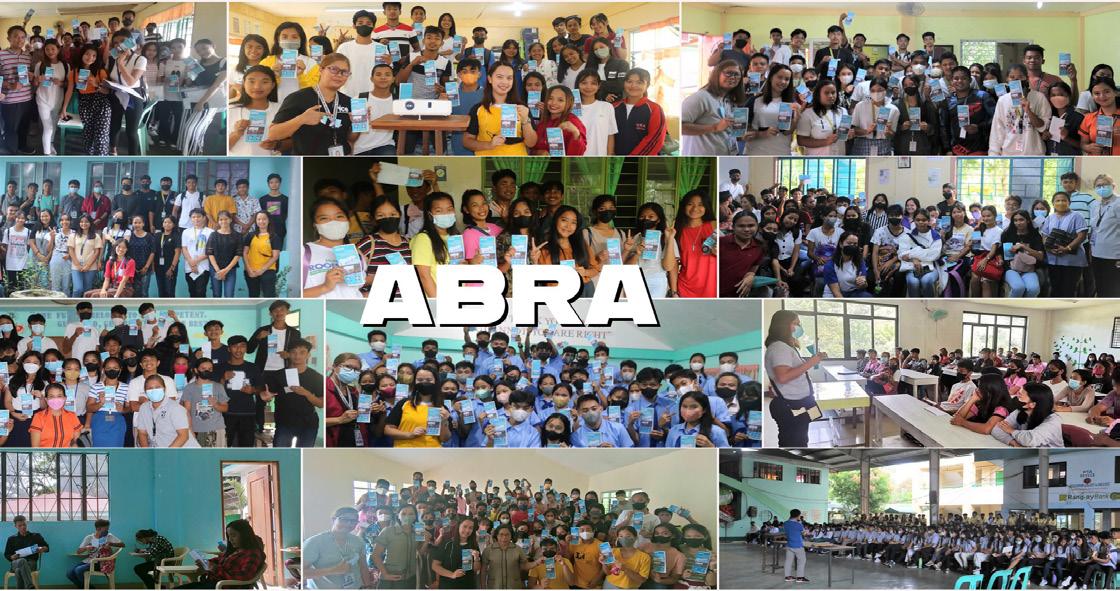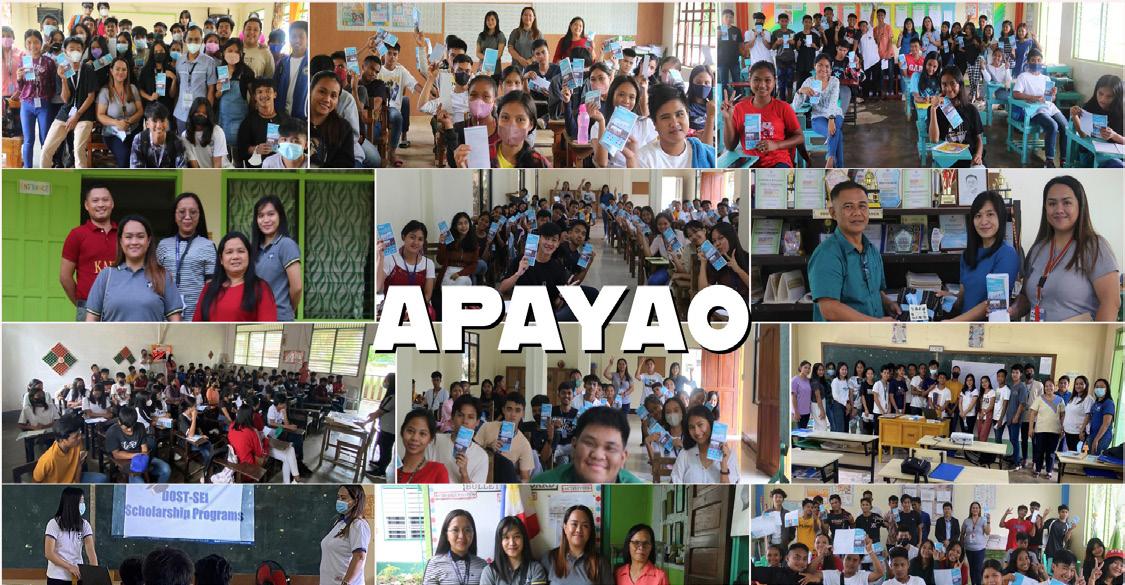
8 minute read
DOST’s OneLab Program Seeks Legislative Support
The One-stop Laboratory Services for Global Competitiveness (OneLab) program of the Department of Science and Technology (DOST) in recent years, has gained significant traction due to its high return rates for its services. The program advocates its sustainability to provide testing and calibration services to over 500,000 customers through its institutionalization. OneLab’s initiative for a unified laboratory information management system partnered with 57 network members of local and international laboratories accredited to the international standard ISO/IEC 17025:2017 expanded its capabilities to engage with Metrology, Rubber, Halal, Food and Drinking Water Safety, Food Innovation Centers, and SETUP, with plans to broaden laboratory services. OneLab collected a total of Php724,064,255.27 from 2017 to 2021, equivalent to an average of Php144,812,851 fees collected annually, and has since been reverted to the national treasury.
These numbers were accumulated from the 1,158,841 tests and calibrations conducted on 781,273 samples submitted to the pool of facilities. The strategy to upgrade laboratories and produce top-level laboratory personnel stems from the foreseen demand for standards and testing laboratories worldwide. With this in mind, the program has set its direction to be smarter as a network of globally renowned laboratories distinguished for its quality, proficiency, and reliability in the provision of testing, calibration, research and development (R&D), and training services. Furthermore, OneLab in its entirety applies to the newly imposed socioeconomic agenda of the current administration which calls for digitalization through providing accessible and efficient government service. In connection to this, the DOST’s planned programs, projects, and activities (PPAs) ensued the creation of a Technical Working Group (TWG) with the purpose of determining the requirements to sustain the program and execute its integrated data system through the creation of the program’s roadmap. The roadmap indicates the plans to engage in training programs, increase and enhance OneLab facilities, expand membership to cater to a wider variety of services, inter-agency collaborations, augment services, to name a few. These efforts support the program’s directive to be globally competitive in providing analytical and calibration services available in one single touch point. The program reinforces its overall strategies to enhance Human Resource, Laboratory Services, Laboratory Network, Laboratory Infrastructure and Facilities, IT Platforms, and Sustainability Strategies. institutions and regional testing laboratories from the DOST and non-DOST members cater to a wide array of services essential to address organizational needs. This includes partnerships with PEZA zones extending S&T support for exporting, being at par with international standards. With the application of international standard testing and implementation of method validation and development, OneLab incorporates systematic processing to augment global recognition of its services.
Advertisement

The program’s sustainability rests on its eventual institutionalization. OneLab’s assistance to its current customers would, in due course, be available to the masses granted that it be provided the relevant funding necessary to maintain its progress. Aside from servicing MSMEs, researchers, LGUs, regulatory agencies and industries it also supports research and development activities making it apparent to gain legislative support to consistently serve the people, certifying inclusive S&T development for all. #OneDOST4U
■ PRESS RELEASE FROM THE OFFICE OF DOST UNDERSECRETARY FOR REGIONAL OPERATIONS SERVICES
To learn more about OneLab’s member laboratories and its offered services, visit web.onelab.ph .
DOST-CAR PSTO Apayao Promotes Brown Rice in Apayao
■ JOVIE SIENA
Apayao, known as the Cordillera’s last frontier is a highly agricultural province particularly since its geography makes possible the production of lowland and highland commodities. Upland agricultural areas are planted with fruit trees, bananas, pineapple, and upland rice where crops are naturally grown and nurtured by precipitation. In 2019, a total area of 1,082 hectares is planted with traditional upland rice (openstat.psa.gov. ph) yielding a total of 5,410 tons of Red Rice, Black Rice, and Palawan Rice (OAS Apayao).
Brown rice is a whole grain that is less processed than white rice. Its hull, bran, and germ are removed leaving the nutrient-packed bran and germ intact with the endosperm. These parts contribute nutrients to brown rice that white rice is lacking, specifically fiber, fat, and protein. Other nutrients found in brown rice include B-vitamins, iron, phosphorus, potassium, and zinc. This makes it a healthy diet especially when paired with exotic delicacies and native dishes. The taste and aroma are distinct from the polished rice which made its prominence with the growing health consciousness of consumers.
Currently, upland rice is hulled using the traditional means using wooden or stone mortar and pestle. Continuous pounding is done until the kernels are completely detached from the hull and afterward separated and cleaned using a winnowing basket. This is a laborious and time-consuming process and produces a high percentage of broken grains thereby compromising the quality of the product.
Moreover, the demand is growing by health-conscious consumers unfortunately, the required volume for local consumption is not met since the majority of the milling machines in the province are only capable of producing polished rice.
These gaps were addressed by DOSTCAR through the Provincial Science and Technology Center of Apayao (PSTC-Apayao) through the provision of science and technology interventions to the Malayugan Rice Granary Farmers Association (MRGFA) in Malayugan, Flora, Apayao, and the Pudtol Upland Farmers Agricultural Cooperative (PUFAC) in Pudtol, Apayao. These two associations are the beneficiaries of the Local Grants-in-Aid (LGIA) Program and were provided with Brown Rice Huller on October 25 and 26, 2022 respectively.
Components of this project will also include the conduct of Training on the Operation and Maintenance of the said equipment, Laboratory Analyses of the product, as well as product packaging and labeling.
This S&T intervention is seen to boost the production of brown rice, improve the production process, generate additional income thereby improving the livelihood of the upland farmers, and support a healthier diet for YApayaos.
DOST-CAR trains MSMEs on cGMP and SSOP in Ifugao, MP
The DOST-CAR conducted of Training on current Good Manufacturing Practices(cGMP) and Sanitation Standard Operating Procedure (SSOP) to PSTOMountain Province Food Safety Consultancy (FSC) beneficiaries on December 6, 2022 and to PSTOIfugao Beneficiaries on December 7-8, 2022.
Engr. Remedios T. Cadaon of WQA Phil. Inc., the Food Safety (FS) Consultant, specifically discussed the GMP requirements which highlighted the importance of safe water supply, cleanliness of equipment, personal hygiene, sanitary facilities, protection of food packaging and contact surfaces from contaminants, proper waste disposal, exclusion of pests and animals from the plant/food continued on pg 20



DOST-CAR concludes its region-wide Scholarship Caravan
■ ROSTON JOHN BONILLA
T
he Department of Science and Technology-CAR successfully concluded its region-wide “Namnama Kadagiti Adda Arapaap Na” Scholarship Information Caravan.
On its bid to promote the 2023 DOST-SEI Undergraduate Scholarship Program, the DOST-CAR journeyed into the outskirts of the region to bring closer S&T education opportunities for the people. This caravan prioritized areas where DOST scholars are significantly under represented. More than a thousand students from 52 participating Senior High Schools (SHS) in the provinces of Abra, Apayao, Benguet, Kalinga, Ifugao, and Mountain Province joined in the caravan that sought to stimulate interest and encourage graduating Grade 12 students to pursue lifetime productive careers in S&T innovation.
With the DOST-SEI Scholarship Program, scholars benefit from increased tuition fees of up to P40,000 per academic year, monthly stipends of P7,000, learning and connectivity allowance of P5,000 per semester, and many other privileges.
Likewise, the DOST-CAR and its Provincial S&T Offices tapped the support of Local Chief Executives (LCEs) to augment the promotional drive within their respective localities. School administrators, SHS educators, and guidance counselors were also oriented briefly on the program. This is to ensure that information is within reach to all aspiring scholars.







DOST Scholar Org established in Kalinga

■ JONALYN SAGUILOT
The Kalinga Association of Innovative DOST Scholars (KAInDS) was organized as a result of the DOST Scholars Leadership Boot Camp in Laoag City, Ilocos Norte from August 31 – September 4, 2022.
Ms. Jonalyn Saguilot, DOST-SEI 2020 RA 7687 scholar, took the initiative to form the said organization in Kalinga, whose main objectives include the creation of linkages and partnerships with agencies, develop more DOST scholars from the province, and open more opportunities for the organization as well as give service to the community.
On December 16, 2022, the KAInDS received its Certificate of Registration from the Office of the Governor as part of the registered Provincial Youth Serving organization in Kalinga. The certificate was awarded by the Provincial Governor Hon. James Edduba. On the same day, Ms. Saguilot took her oath as a member of the Provincial Youth Development Council (PYDC).
The members of the organization also participated in the completion of all the required documents to be part of the Provincial Youth organization and attended various seminars and workshops which was conducted by the PYDC.
Along with creating linkages, the organization also conducted various activities including scholarship campaigns, donation drives, and assisting applicants to the DOST scholarship, among others.
Specifically, KAInDS participated in the donation drive for the victims of typhoon Paeng in collaboration with the North Luzon Cluster scholars. Project Busilak, a donation drive for the students of Maswa Elementary School was also conducted wherein KAInDS was able to collect PhP 6,221 cash donations for sports equipment and in-kind donations that were given to beneficiaries on December 29, 2022.
The KAInDs was also recognized as a suborganization of the Association of Competent and Empowered CAR DOST Scholars (ACE CARDS), a regional organization of DOST-CAR Scholars on September 28, 2022 as well as membership to the Positive Youth Development Network, a network of youth organizations around the Philippines on December 14, 2022.







